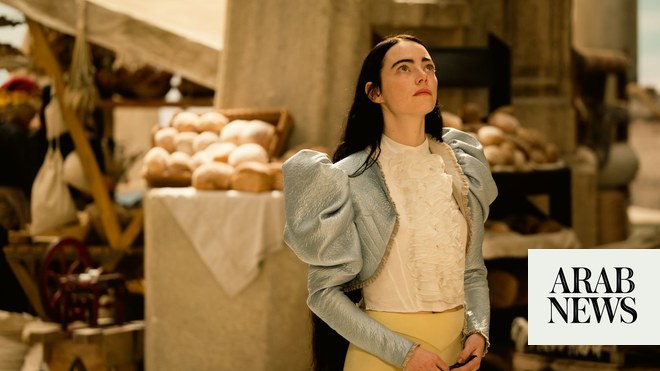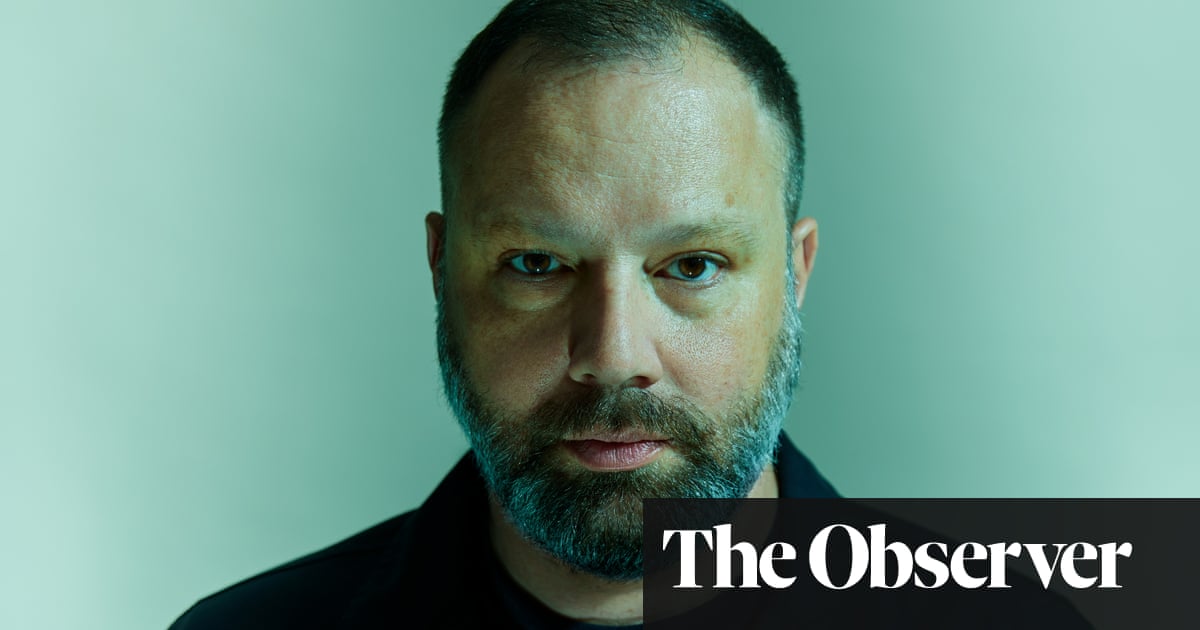
Three years ago, shortly before dawn, Elle McAlpine was catching the train home, having just orchestrated an orgy. She had left the set of sci-fi series Brave New World: a night-time shoot where more than 100 dancers descend into sexual revelry.
McAlpine laughs to remember her journey home, sitting on the tube alongside her fellow passengers, still processing the scene she’d just presided over. “I was like, ‘If people knew what I’ve just done …’
“For all intents and purposes, it looked real, as well: all these amazing dancers, just undulating on the floor.”
McAlpine’s latest project to raise eyebrows is Yorgos Lanthimos’ Poor Things: the multi-Oscar-nominated fantasy adapted from Alasdair Gray’s novel.
The extravagant, otherworldly look of Poor Things has also been widely acclaimed. The content, however – which finds Emma Stone playing a grown woman with a baby’s brain, setting out on a globetrotting journey of sexual self-discovery – is proving polarising.
As Poor Things’ intimacy coordinator, McAlpine worked at the intersection of both. Brought on to the project at a late stage, after Lanthimos and Stone had already settled on its parameters, McAlpine was tasked with how to bring them to life as comfortably as possible.
Both the director and star have praised McAlpine’s contribution in interviews – though Stone admitted to having been “stupidly” sceptical at the start.
By then, they’d already had months of rehearsals, says McAlpine: “They’d built a language together … It was her way of saying ‘I’ve got me, Yorgos has got me, I’m OK’.” But – as McAlpine said to Stone in their initial conversation – she wasn’t the only player who could benefit from an intimacy coordinator: it takes two to tango (with Stone’s primary on-screen partner Mark Ruffalo playing the caddish lawyer who lures her away from home).
In the case of the Brave New World orgy, it took 120, and took two days to film, remembers McAlpine: during a dance, “all of a sudden everybody strips off, they fall to the floor and start having sex”.
For that scene alone, McAlpine worked alongside three other intimacy coordinators, each assigned a group of 30-odd dancers to look after; plus a choreographer to oversee the overall effect.
An actor herself, McAlpine was hands-on, demonstrating “how you penetrate” on screen: “If you can move your coccyx, just arch your back slightly, it looks fantastic,” she says happily. “Those orgy scenes were amazing.”
By the time she graduated from drama school, in September 2017, McAlpine had done “a few kissing scenes” and simulated sex in a short film (non-penetrative, she adds). Then she participated in a workshop led by Ita O’Brien, hailed as one of the frontrunners of “the intimacy profession”.
The workshop was open to media; a photo of McAlpine, her back arched, appearing to come to climax, became a two-page spread in the Sunday Times’ magazine. McAlpine was surprised by not only the convincing effect of the choreography, but the pride she felt, seeing the result: “It blew me open.”
Though some directors do discuss on-screen sexual boundaries with their cast, many lack the necessary understanding; plus on-set hierarchies make it hard to speak freely, says McAlpine. “There is a language in this work that helps make it professional … that helps people open up, and really consider what might make them feel uncomfortable.”
Soon after, McAlpine began training under O’Brien, working on shows such as Netflix’s Sex Education and It’s a Sin. (In many of the latter’s sex scenes, McAlpine is just off-camera, hiding behind the bed or in a cupboard, ready to intervene.)
Back then – only seven years ago, and after #MeToo – there was still widespread industry scepticism about the role of intimacy coordinators, says McAlpine. She recalls having to advocate for the role as much as the actors she was working with, “almost having to sell yourself … and explain what we do”.
Not every director was receptive. Often O’Brien and her team were perceived as a threat to the production, says McAlpine. Their being mostly women meant there was also an undercurrent of sexism. “I definitely felt it … especially as a young woman, working with very seasoned people who have never had this red tape before.”
McAlpine is still only 33. “At the beginning, when we were trying to vouch for ourselves, I felt such a pressure: the scene had to be good.” Sometimes the hostility was overt, even “attacking”, says McAlpine; there was no room for mistakes or improvements. “I was kicked off a couple of sets because I wasn’t helping, clearly.”
On one project she went beyond her remit, blurting out “cut” on a scene: “I just felt so uncomfortable, because the actor was really uncomfortable, and I could tell.”
After 18 months of working with O’Brien, McAlpine co-founded (with fellow actor and “movement director” Katharine Hardman) her own business, EK Intimacy. These days, not only is she more experienced and self-assured in her work, the industry has changed to make room for it, with the Screen Actors Guild making intimacy coordinators mandatory on sets in 2020.
Now meetings with directors feel “more like a chemistry read”, says McAlpine; and the role has gone from being mostly about safeguarding to allow for more creative expression. There are still “risk assessments up to your eyeballs”, she says, and paperwork to protect the production from legal action down the line – but more and more, intimacy coordinators are exploring what can be expressed through sex on screen.
“It’s about understanding the tone: what the intimate storytelling is, how it serves each character, what kind of positions you can think of that are slightly more nuanced and exciting,” says McAlpine. A leading actor told her that, to get into character, he thinks about what they are like in the bedroom. After all, it’s not necessarily reflecting the actors’ own lived experience, she adds. “If you’ve had a conversation about the sexual expression of a character, I tell you, they will then deliver the most amazing performance, because they’re so filled up with creativity.”
When a scene calls for more than an actor is willing to give, there are modesty garments, cushions and protective layers. It is possible to make an actor appear naked in a bathtub when they are in fact fully clothed, says McAlpine: “There are so many tricks you can do.”
For her, there is also an educational side to the role; a responsibility to show sex as it “actually happens in real life” – with pubic hair, lubrication, stained sheets and “all that awkward fumbling”.
Last year the Children’s Commissioner found that 10% of children had seen pornography by the age of nine, and 27% by age 11, leading to lower self-esteem as young adults. A 2017 YouGov survey also showed that 32% of young people had never seen a condom used in sex scenes on screen, perhaps explaining their low use.
McAlpine recalls watching Grease as a child, and being bemused by the broken condom scene: “I’m like, ‘You taught me so little in that moment, when there was an opportunity’ … Let’s actually really think about what sex we’re showing here.”
Certainly, the sex on Poor Things has been intensely interrogated. Lanthimos has said he has “never understood the prudishness” about sex on film, especially given the relatively laissez-faire attitude to depictions of violence, even for younger audiences. Even sexual violence, McAlpine adds: “We’re much more willing to watch rape than we are a fully consensual, slightly off-the-beaten-track sexual scene. What does that say?”
In some ways, Poor Things challenges that narrative. Bella’s discovery of sex – alone, and with partners – is key to her development; a pleasure ranked alongside food, music and dance. The character’s childlike curiosity, and gleeful pursuit of her base impulses, are “so beautiful”, says McAlpine. “I think there’s a severing of head and body, in general in our society – we are so cerebral.”
To her, Tony McNamara’s script posed the question: “What would happen if we listened to our bodies more? And sex is a massive part of that … You can sense, with orgasm, what people strive for when they take drugs: it’s oblivion – and we are constantly seeking it.”
But the debate over the film’s representation of sex can’t be ascribed simply to mere prudishness. Though some have criticised Bella’s enthusiasm for sex (or “furious jumping”, as she terms it) as a “male fantasy”, the controversy has largely settled on the middle portion of the film, when Bella finds herself broke and in Paris, and goes to work in a brothel.
Here she is confronted by the darker underbelly of her passion, including violence and misogyny – all the while navigating it, uncomfortably, with her child’s mind. “The understanding behind the transaction is that it’s something that she consents to, and wants – until she doesn’t,” says McAlpine.
She sees Bella’s stint in Paris as a dark, violent reality check, and “typically masculine” contrast to the “free and fluid” feminine essence that she has embodied thus far: “Culture, and society, are imposed on her.” Of course, McAlpine adds, the reality of leaving sex work is “much harder than this film suggests”. But “it had other places to go”.
She admits that Bella’s development made those scenes a challenge: “This is a baby’s brain, in a woman’s body, and we’re doing ‘furious jumping’. How does that sit with me, as a human being?” It was not that she felt judgmental, McAlpine adds: “I went in to do a job … As the intimacy coordinator, you’re there to serve the vision.”
But she resists the characterisation, by some, of Bella as a sex worker with the mental age of a toddler; McAlpine herself imagined her as a 16- or 17-year-old.
Did she have to think that, for her own self-preservation? Though she did not discuss it with Lanthimos or Stone, McAlpine agrees that “subconsciously” that might have been a factor. “I think, at that point, there’s an autonomy there that I don’t think children have. She’s making decisions … I understood where she was at in her development, and it didn’t feel too jarring.”
The discussion provoked by Poor Things – an unwieldy and often unsettling proposition – at least speaks to the thorniness of representing sex on screen. Intimacy coordinators may be able to ensure everyone’s comfortable on set, but that doesn’t extend to the audience.
The film was given an 18 classification in the UK only after changes were made to a scene in which a man brings his two young sons to the brothel to learn about sex.
The intimacy scenes between the boys’ father and Bella were shot without the child actors in the room, says McAlpine, making certain shots “quite difficult” – but they were approached with the same care, constant communication and strenuous attention to consent as the rest of the film.
McAlpine laughs to recall an early conversation with the youngest boy’s parents, briefing them exactly on the scene: “They were like, ‘Oh, he watches Game of Thrones all the time, so that’s fine’.”
This article was amended on 3o January 2024. Poor Things was classified as 18, not R18 as stated in an earlier version.












